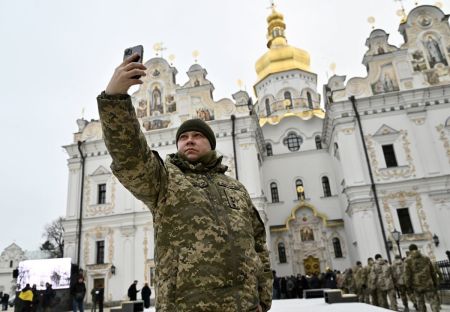Orthodox group accuses Tucker Carlson of spreading 'Russian propaganda' on Christian persecution

The Orthodox Public Affairs Committee has condemned former Fox News anchor Tucker Carlson's recent comments about Christian persecution in Ukraine, accusing the media personality of spreading "Russian propaganda."
The U.S.-based organization advocating for the global Orthodox church criticized Carlson in a Monday statement provided to The Christian Post, charging the conservative pundit with creating further division during his Friday interview with former Vice President Mike Pence.
"The Orthodox Public Affairs Committee (OPAC) expresses its deep concern over media personalities, like Tucker Carlson, who continue to spout Russian propaganda about so-called persecution of Christians in Ukraine," the OPAC statement reads.
"Carlson, who has little or no understanding of the complexities of the religious reality of Ukraine, only forments more division with his nonsensical statements as he did in an interview with former Vice-President Mike Pence at the Family Leadership Summit in Iowa over the weekend."
Carlson's interview with the 2024 presidential hopeful occurred at the Family Leadership Summit in Des Moines, Iowa, this past weekend.
At one point during the interview, Carlson questioned Pence if he asked Ukrainian President Volodymyr Zelensky about the treatment of Christians in Ukraine during his meeting with the leader in June. Pence had voiced support for the U.S. giving Ukraine resources to thwart the Russian invasion.
Carlson said that Zelensky's government had raided convents, arrested priests and "effectively banned a Christian denomination."
Pence responded that he asked a Ukrainian Orthodox leader about the issue when visiting Kyiv, who assured the former Indiana governor that Zelensky's government is respecting religious liberty.
According to Pence, the church leader said the Zelensky government was being cautious due to elements of the Russian Orthodox Church attempting to "advance the Russian cause in Ukraine."
The OPAC, which was founded by a former Trump White House official in 2020, stated that the Ukrainian Orthodox Church cut ties with the Moscow Patriarchate — the Russian Orthodox Church — following Russia's invasion of Ukraine in February 2022. The leader of the Russian Orthodox Church, Moscow Patriarch Krill, has publicly endorsed Russia's war with Ukraine, and Russian clergy members who disagree with him have faced punishments.
As OPAC noted, 1 million UOC adherents are in Russian-occupied parts of Ukraine, which the group noted creates an additional complication, as "the Kyiv Caves Monastery is central to Ukrainian Orthodox identity."
In March, Ukraine instructed the UOC church with historic ties to Russia to vacate its 980-year-old Kyiv-Pechersk Lavra monastery complex. The Ukrainian culture ministry claimed that the church "violated the terms of the agreement regarding the use of state property," while UOC initially claimed it was the victim of a political witch hunt.
"The house arrest of the UOC Abbot of the Monastery, Metropolitan Pavel, and the subsequent expulsion of the UOC clergy and monastics from the Monastery occurred because of security concerns over the suspicion that some UOC clergy might be a Russian 'fifth column' in Ukraine," OPAC explained.
"OPAC in no way condones religious persecution of any group, but acknowledges that until the UOC situation is resolved in some canonical way and integrated with the Orthodox Church of Ukraine (OCU), there will be inevitable and occasionally unfortunate repercussions," the group continued. "The complicity of the Moscow Patriarchate's leadership in the war crimes being perpetrated in Ukraine remains deeply hurtful and divisive. It is clear that this leadership is under the total control of Putin and his henchmen."
The public advocacy group called for the Ecumenical Patriarchate to facilitate communication between UOC under Metropolitan Onufry and the Autocephalous Orthodox Church of Ukraine (OCU) under Metropolitan Epiphaniy. OPAC believes that this action will establish a "unified national identity" under the country's Orthodox Church and provide UOC with "canonical standing" following its split from the Moscow Patriarchate in May 2022.
"OPAC, in addition to its demand for the immediate cessation of hostilities and the complete withdrawal of Russian forces from Ukraine, insists on punitory measures including trials for war crimes for all who have prosecuted this unjust and horrific war," the group concluded.
Regarding the ongoing Russian-Ukrainian conflict, groups such as Global Christian Relief have raised concerns about Russia conducting a religious persecution campaign in Ukraine. In an interview earlier this month with CP, David Curry, the head of Global Christian Relief, highlighted various instances of religious persecution in Ukraine since the start of Russia's invasion.
These attacks have involved the targeting of churches and worship leaders, with many leaders in the Russian Orthodox Church justifying these actions. According to Curry, many of these leaders believe that Russia is "divinely inspired" to take the land.
In a report last month, Global Christian Relief broke down how Russian soldiers seized the Ukrainian Christian Evangelical Church of the Holy Trinity in Mariupol two months ago. After expelling the clergy, around 30 troops remained inside the church building, as its proximity to occupied residential areas made it an effective shield.
The Ukrainian Institute for Religious Freedom shared data in late January at the Summit on International Religious Freedom that suggested that the Russian military has destroyed nearly 500 religious buildings, theological institutions and sacred places since the beginning of the invasion.
Russia has also murdered at least 26 religious leaders while torturing and imprisoning others, according to testimony from Dmytro Vovk of the Organization for Security and Cooperation in Europe Office for Democratic Institutions and Human Rights during a March U.S. Commission on International Religious Freedom hearing.
Samantha Kamman is a reporter for The Christian Post. She can be reached at: [email protected]. Follow her on Twitter: @Samantha_Kamman






















